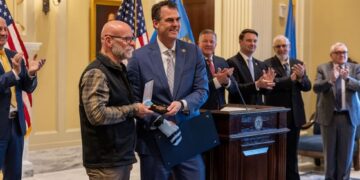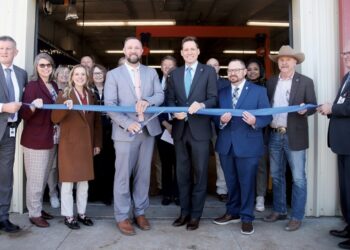By Rick Nagel and Tim Pehrson
A state cannot succeed to its fullest potential without a thriving workforce, and for a workforce to thrive, it must operate with the focused efficiency of our nation’s most successful industries.
Oklahoma has the potential for a booming workforce. It has a wealth of successful industries spanning sectors that range from oil and gas to aerospace to health care to telecommunications to farming and agriculture. It has talented men and women who go to work every day, carrying within them a hope that their efforts will pave a path to prosperity for them and their family. And the state wants to grow by giving aspiring entrepreneurs opportunities to start their success stories and by welcoming proven companies to expand into the state.
But the vast promise and potential of Oklahoma’s future is undercut by the lack of focus and coordination in our state’s workforce system. Workforce has been listed as Oklahoma businesses’ most difficult challenge multiple years in a row, yet nothing has been done.
Although Oklahoma’s unemployment rate is a low 3 percent and routinely stays below 4 percent, there are thousands of open jobs each month. Businesses throughout the state frequently need more workers to fill open positions. In addition, Oklahoma’s labor participation rate – the percentage of working-age Oklahomans actively participating in the workforce – was staggeringly low at 60.5 percent in December 2022, which ranked 35th in the nation.
All members of the state government have a hand in workforce, but no one is captaining the ship. There is not one person or entity tasked with the responsibility of coordinating Oklahoma’s workforce. We need someone at the helm of the ship who will wake up every day and go to work thinking solely about how to make the talent pipeline in Oklahoma better.
Other states have flourished by implementing a workforce management system, including Ohio with JobsOhio, Utah with its Governor’s Office of Economic Opportunity, Florida’s Career Source Florida and Texas’ Workforce Commission. There is no harm in borrowing great plans from our neighbors.
Senate Bill 621 creates the Oklahoma Workforce Commission. The Commission will be comprised of business leaders from the private sector who will be tasked with coordinating and developing Oklahoma’s workforce, creating a workforce plan and utilizing public and private funds to carry out its mission.
Oklahoma needs a singular workforce owner, a leading force that will set visions and goals to fulfill workforce needs, reduce administrative costs, eliminate wasteful duplication, align funding with goals that produce effective results and hold state entities accountable for failures and shortcomings. The bill presents a plan that will establish leadership and bring the state’s workforce into alignment.
The Workforce Commission will not only coordinate today’s talent pipeline, but it will also build tomorrow’s workforce by aligning the state’s industries with its educational institutions. The Commission will work to ensure that students receive specialized education and training that will send them down clear and concise pathways to their future careers. This forward-thinking Commission will not only provide Oklahomans with the knowledge needed to transition into the workforce, but also the discipline and sense of direction the state needs to succeed in the future.
The time is now to refocus Oklahoma’s goals across our workforce development system. Doing so will help revitalize our economy and create a promise of prosperity that will grow this state into the future. Passing SB 621 is essential for Oklahoma to succeed.
Rick Nagel is managing partner of Acorn Growth Companies. Tim Pehrson is president and CEO of Integris Health.

















